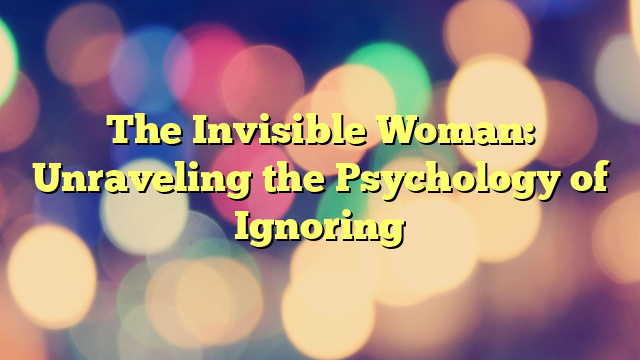The Invisible Woman: Unraveling the Psychology of Ignoring
The Invisible Woman: Unraveling the Psychology of Ignoring
The Power of Invisibility
Have you ever felt like you were invisible? Like no matter what you did or said, people just didn’t seem to notice you? This phenomenon, known as being ignored, can have a profound impact on a person’s mental and emotional well-being. In this article, we will delve into the psychology behind ignoring and explore the reasons why some individuals may feel invisible.
The Psychology Behind Ignoring
Ignoring someone is a complex psychological behavior that can stem from a variety of underlying factors. One possible explanation is that the person doing the ignoring may feel a sense of power or control over the individual being ignored. By intentionally disregarding someone, they are able to assert their dominance and establish a hierarchy.
Another reason for ignoring could be rooted in feelings of jealousy or envy. When someone feels threatened by another person’s success or popularity, they may choose to ignore them as a way to diminish their accomplishments and maintain their own self-esteem.
Additionally, ignoring can be a form of punishment or retaliation. If someone feels wronged or hurt by another person, they may choose to ignore them as a way to express their displeasure and seek retribution.
The Impact of Ignoring
Being ignored can have a profound impact on a person’s mental and emotional well-being. It can lead to feelings of loneliness, isolation, and low self-esteem. When someone is consistently ignored, they may begin to question their worth and value as a person.
Furthermore, being ignored can also have negative effects on one’s social interactions and relationships. It can create a barrier between individuals and hinder effective communication. Over time, this can lead to a breakdown in relationships and a sense of disconnection from others.
Coping with Being Ignored
While being ignored can be a challenging experience, there are strategies that individuals can employ to cope with this situation. One approach is to focus on self-care and self-acceptance. By nurturing oneself and recognizing one’s own worth, it becomes easier to withstand the impact of being ignored.
Another strategy is to seek support from trusted friends or family members. Talking about one’s feelings and experiences with someone who can provide empathy and understanding can be incredibly helpful in navigating the emotions associated with being ignored.
It is also important to remember that being ignored is not a reflection of one’s own value or worth as a person. It is often a reflection of the insecurities and issues of the person doing the ignoring. By recognizing this, it becomes easier to detach oneself from the situation and not take it personally.
Breaking the Cycle of Ignoring
Breaking the cycle of ignoring requires both self-reflection and open communication. If you find yourself consistently being ignored, it may be helpful to examine your own behavior and interactions with others. Are there any patterns or habits that may be contributing to this dynamic?
Additionally, it may be beneficial to have an open and honest conversation with the person who is ignoring you. Express your feelings and concerns in a calm and non-confrontational manner. By addressing the issue directly, you may be able to gain insight into their motivations and work towards resolving any underlying conflicts.
Conclusion
Being ignored can be a painful and isolating experience. However, by understanding the psychology behind ignoring and implementing coping strategies, individuals can navigate this situation with resilience and self-compassion. Remember, you are not invisible, and your worth is not determined by the actions or opinions of others.
| Reasons for Ignoring | Impact of Ignoring | Coping Strategies |
|---|---|---|
| Power and control | Loneliness and low self-esteem | Self-care and self-acceptance |
| Jealousy and envy | Breakdown in relationships | Seeking support from others |
| Punishment and retaliation | Disconnection from others | Recognizing it’s not personal |
By understanding the psychology behind ignoring and implementing coping strategies, individuals can navigate this situation with resilience and self-compassion. Remember, you are not invisible, and your worth is not determined by the actions or opinions of others.

